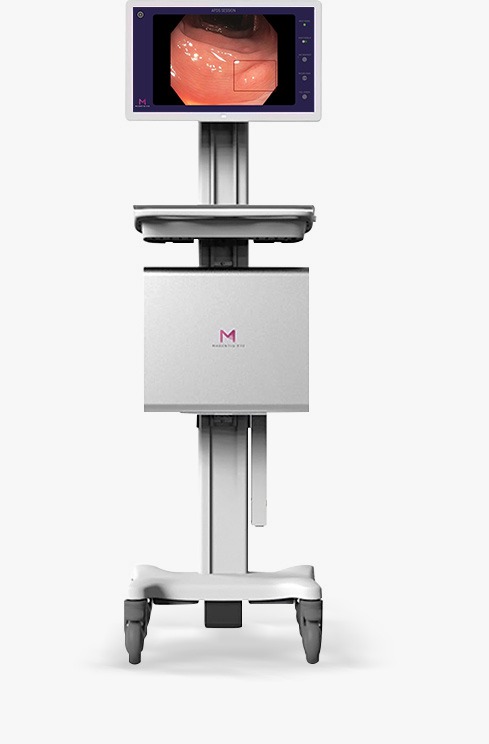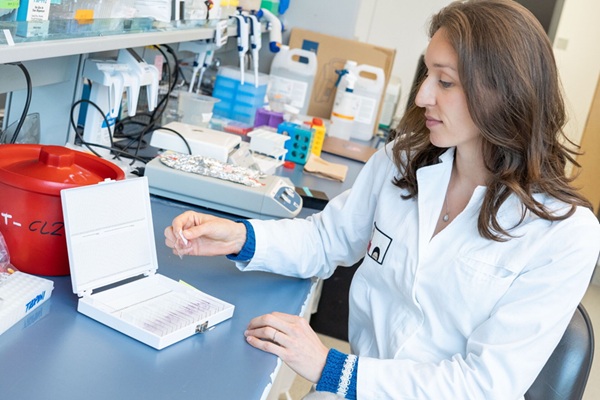AI-Aided Colonoscopy Technology Improves Adenoma Detection Rates
|
By HospiMedica International staff writers Posted on 26 Feb 2024 |

Colorectal cancer (CRC) is the third most prevalent cancer worldwide, and one of the deadliest. Typically, CRC begins with polyps or other precancerous growths in the colon or rectum. These can be spotted during a colonoscopy, a procedure where an endoscope with a camera is inserted through the rectum to examine the entire colon for anomalies. Despite its widespread adoption in many developed countries, the standard colonoscopy process has a notable drawback: high rates of missed and undetected adenomas. This means that even regularly screened patients remain at risk of developing colon cancer. As a result, the integration of Artificial Intelligence (AI) and Machine Learning (ML) into colonoscopy has emerged as a groundbreaking advancement in high-performance gastroenterology clinics, enhancing diagnostic accuracy and aiding in clinical decisions.
Now, new research has found that MAGENTIQ-EYE Ltd.’s (Haifa, Israel) AI-powered polyp detection system can improve adenoma detection rates (ADRs). The system, known as MAGENTIQ-COLO, fits seamlessly into the existing colonoscopy procedure, helping gastroenterologists identify polyps by providing information about their size, type, and maturity level, without disrupting the process. The MAGENTIQ-COLO device captures digital video signals from the endoscopy setup and applies deep learning algorithms in real time. It highlights detected polyps with a bounding box on the main or an auxiliary screen, drawing the doctor’s attention to potential concerns during the procedure.
Additionally, the system presents details about the polyp's size and characteristics on the screen's left side, offering the gastroenterologist vital insights for polyp identification and decision-making. After the procedure, videos with or without the bounding boxes can be stored and reviewed later. MAGENTIQ-COLO also generates a comprehensive report that includes the procedure's duration and findings, viewable on the device’s monitor and exportable for further use. A comprehensive 14-month study across 10 top medical centers, involving 31 endoscopists and 952 patients, underscores MAGENTIQ-COLO's leading performance in AI-assisted colonoscopy. This multicenter, randomized, controlled trial encompassed patients referred for non-immunochemical fecal occult blood test (iFOBT) screening or surveillance colonoscopy.
Participants were randomly assigned to either CAD-assisted or conventional colonoscopy, with a subset undergoing tandem colonoscopies (CAD followed by conventional or vice versa). The study focused on primary objectives like adenoma per colonoscopy (APC) and adenoma per extraction (APE), and secondary objectives such as the adenoma miss rate (AMR) in tandem colonoscopies. Results showed that MAGENTIQ-COLO boosted ADR by 7% in absolute terms. A higher ADR is closely linked to reduced CRC incidence and mortality. The study also assessed the system’s impact on AMR, revealing a 17% absolute reduction in AMR with the use of MAGENTIQ-COLO.
"It is important to note that measuring changes in both ADR and AMR in a single study is a novelty,” said Dror Zur, Founder and CEO of MAGENTIQ EYE. “In addition to FDA approval that we received last year, this milestone is a testament to the impact of MAGENTIQ-COLO™ in advancing the quality of colonoscopy and setting new healthcare standards in order to save more and more lives."
Channels
Artificial Intelligence
view channelCritical Care
view channel
Intranasal Spray to Prevent Illnesses from Respiratory Viruses
Respiratory viruses such as influenza and COVID-19 hospitalize more than one million people in the U.S. each year, with many infections spreading through close contact in households, schools, and workplaces.... Read more
AI Risk Prediction Tool Improves Treatment of Cancer Patients after Heart Attack
Cancer patients who experience a heart attack face a uniquely dangerous combination of risks, including higher chances of death, bleeding, and repeat cardiac events. Because of this complexity, they have... Read morePatient Care
view channel
Revolutionary Automatic IV-Line Flushing Device to Enhance Infusion Care
More than 80% of in-hospital patients receive intravenous (IV) therapy. Every dose of IV medicine delivered in a small volume (<250 mL) infusion bag should be followed by subsequent flushing to ensure... Read more
VR Training Tool Combats Contamination of Portable Medical Equipment
Healthcare-associated infections (HAIs) impact one in every 31 patients, cause nearly 100,000 deaths each year, and cost USD 28.4 billion in direct medical expenses. Notably, up to 75% of these infections... Read more
Portable Biosensor Platform to Reduce Hospital-Acquired Infections
Approximately 4 million patients in the European Union acquire healthcare-associated infections (HAIs) or nosocomial infections each year, with around 37,000 deaths directly resulting from these infections,... Read moreFirst-Of-Its-Kind Portable Germicidal Light Technology Disinfects High-Touch Clinical Surfaces in Seconds
Reducing healthcare-acquired infections (HAIs) remains a pressing issue within global healthcare systems. In the United States alone, 1.7 million patients contract HAIs annually, leading to approximately... Read moreHealth IT
view channel
EMR-Based Tool Predicts Graft Failure After Kidney Transplant
Kidney transplantation offers patients with end-stage kidney disease longer survival and better quality of life than dialysis, yet graft failure remains a major challenge. Although a successful transplant... Read more
Printable Molecule-Selective Nanoparticles Enable Mass Production of Wearable Biosensors
The future of medicine is likely to focus on the personalization of healthcare—understanding exactly what an individual requires and delivering the appropriate combination of nutrients, metabolites, and... Read moreBusiness
view channel
Medtronic to Acquire Coronary Artery Medtech Company CathWorks
Medtronic plc (Galway, Ireland) has announced that it will exercise its option to acquire CathWorks (Kfar Saba, Israel), a privately held medical device company, which aims to transform how coronary artery... Read more
Medtronic and Mindray Expand Strategic Partnership to Ambulatory Surgery Centers in the U.S.
Mindray North America and Medtronic have expanded their strategic partnership to bring integrated patient monitoring solutions to ambulatory surgery centers across the United States. The collaboration... Read more
FDA Clearance Expands Robotic Options for Minimally Invasive Heart Surgery
Cardiovascular disease remains the world’s leading cause of death, with nearly 18 million fatalities each year, and more than two million patients undergo open-heart surgery annually, most involving sternotomy.... Read more















